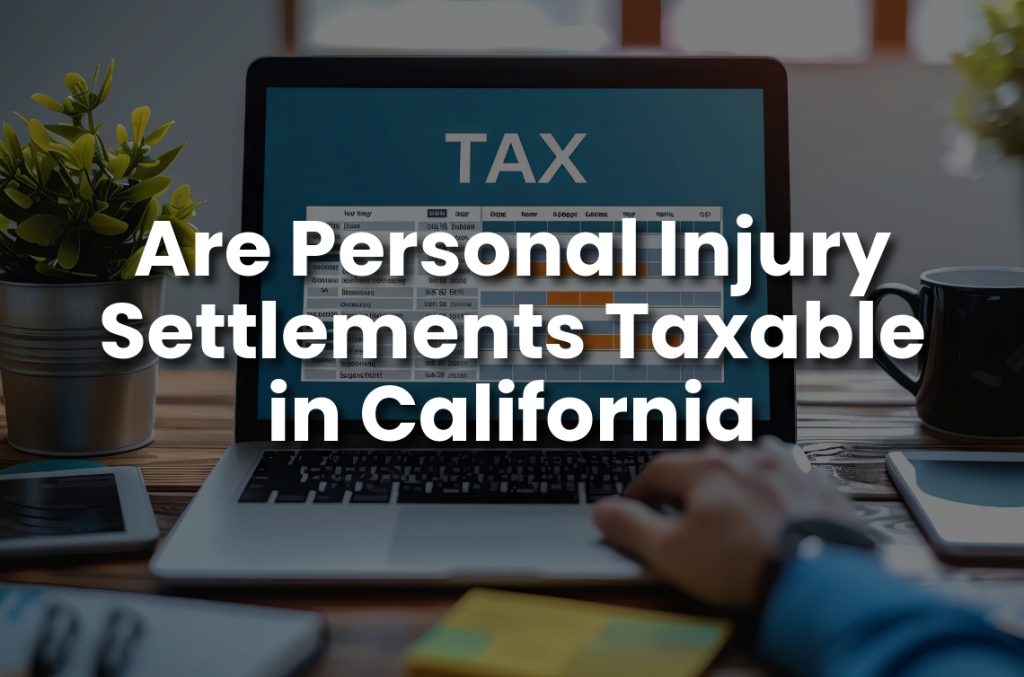If you’ve recently received or are expecting a personal injury settlement in California, you’re likely wondering, “Are personal injury settlements taxable?” It’s a question that understandably sparks concern, as the IRS has a reputation for taxing just about every income source imaginable. The good news, especially for Californians, is that most personal injury settlements are not subject to state or federal taxes. However, there are important exceptions and distinctions to be aware of.
If you’re still learning about personal injury cases, check out our guide on the common causes of personal injuries in California.
Understanding the Basics: When Are Injury Settlements Non-Taxable?
Under federal tax laws, which California also follows, compensation received from personal injury settlements specifically intended to cover physical injuries or illness is usually exempt from taxation. According to the IRS (specifically 26 U.S. Code § 104), settlements related to “observable bodily harm” such as those from motor vehicle accidents, slip and falls, and medical malpractice are typically non-taxable.
Here’s a quick list of common non-taxable personal injury damages:
- Medical expenses (hospital bills, surgeries, rehabilitation)
- Pain and suffering directly related to physical injuries
- Emotional distress directly resulting from physical injury
- Loss of companionship
- Property damage related to the accident
To learn more about how each of these categories may apply to your case, see our full breakdown of damages in personal injury cases.
But When Could Your Settlement Be Taxable?
- Lost Wages: If your settlement compensates you for lost wages, this portion is taxable since it’s income you would have earned.
- Punitive Damages: These are awarded as a form of punishment to the defendant rather than compensation for your injuries. Because they’re not considered compensatory, punitive damages are always taxable and must be reported as “other income” on your tax return.
- Interest: Any interest you receive on your settlement amount (like pre-judgment or post-judgment interest) is taxable.
- Emotional Distress Without Physical Injury: Damages received for emotional distress not directly caused by a physical injury or sickness are taxable. For example, if stress or anxiety occurred independent of a physical injury, these damages could be taxable.
How Do You Handle Medical Expenses?
Medical expense reimbursements can get a bit tricky. If you’ve previously deducted medical costs from your taxes, any settlement money reimbursing those expenses may be taxable. This is known as the “tax benefit rule.” Always discuss with your accountant to handle these specifics correctly.
Reporting Your Settlement to the IRS
Although many personal injury settlements aren’t taxable, you still need to be careful with how your settlement is documented. Clearly separate taxable from non-taxable portions in your settlement documents, and keep thorough records. Misclassifying these funds could invite unwanted scrutiny from the IRS.
If your settlement includes taxable amounts, you’ll generally report them as “Other Income” on your Form 1040. Consulting with a tax professional or accountant to properly navigate these requirements can save you stress and potentially costly mistakes down the road.
The Bottom Line: Stay Informed and Seek Professional Advice
While most personal injury settlements in California aren’t taxable, the exceptions—lost wages, punitive damages, certain emotional distress awards, and settlement interest—require careful attention. To avoid confusion, clearly document your settlement details, and consult a tax professional to ensure you’re fully compliant.
By understanding these nuances, you’re better equipped to protect your settlement and your peace of mind.
Still Have Questions About Your Personal Injury Settlement?
Navigating the tax implications of your personal injury settlement can be complicated, but you don’t have to handle it alone. At Muhareb Law Group, Inc., we’re dedicated to helping Californians understand their settlements clearly, making sure you get maximum compensation and avoid unnecessary IRS headaches.
Also, if you’re unsure how much time you have to file a claim or if your deadline has passed, check out our guide on the California personal injury statute of limitations. It’s important to know how long you have before important legal rights expire.
For personalized guidance on your case and settlement questions, contact Muhareb Law Group, Inc. today for a free consultation. Let our experienced attorneys help you keep your settlement protected. Call (909) 519-5832.
Frequently Asked Questions About Taxable Injury Settlements in California
1. Are personal injury settlements taxable in California?
Generally, no. Compensation for physical injuries or illness is not taxable under federal or California law. This includes damages for medical expenses, pain and suffering, and emotional distress related to physical injuries.
2. Which parts of a personal injury settlement are taxable?
Taxable portions may include:
- Lost wages
- Punitive damages
- Interest earned on the settlement
- Emotional distress not caused by physical injury
Each of these is treated as taxable income by the IRS and must be reported accordingly.
3. Do I have to report my personal injury settlement to the IRS?
If your settlement includes taxable amounts, yes. You’ll typically report them as “Other Income” on IRS Form 1040. Clear documentation is important to separate taxable and non-taxable portions.
4. What is the tax benefit rule for medical expenses?
If you previously deducted medical expenses on your taxes and then receive a settlement reimbursing those same costs, that portion may become taxable. This is known as the tax benefit rule. A tax professional can help ensure proper reporting.
Phone:
Office: (909) 519-5832
Direct: (909) 437-7810
Fax:
(909) 935-3858
Mail:
muhareb@muhareblawgroup.com
